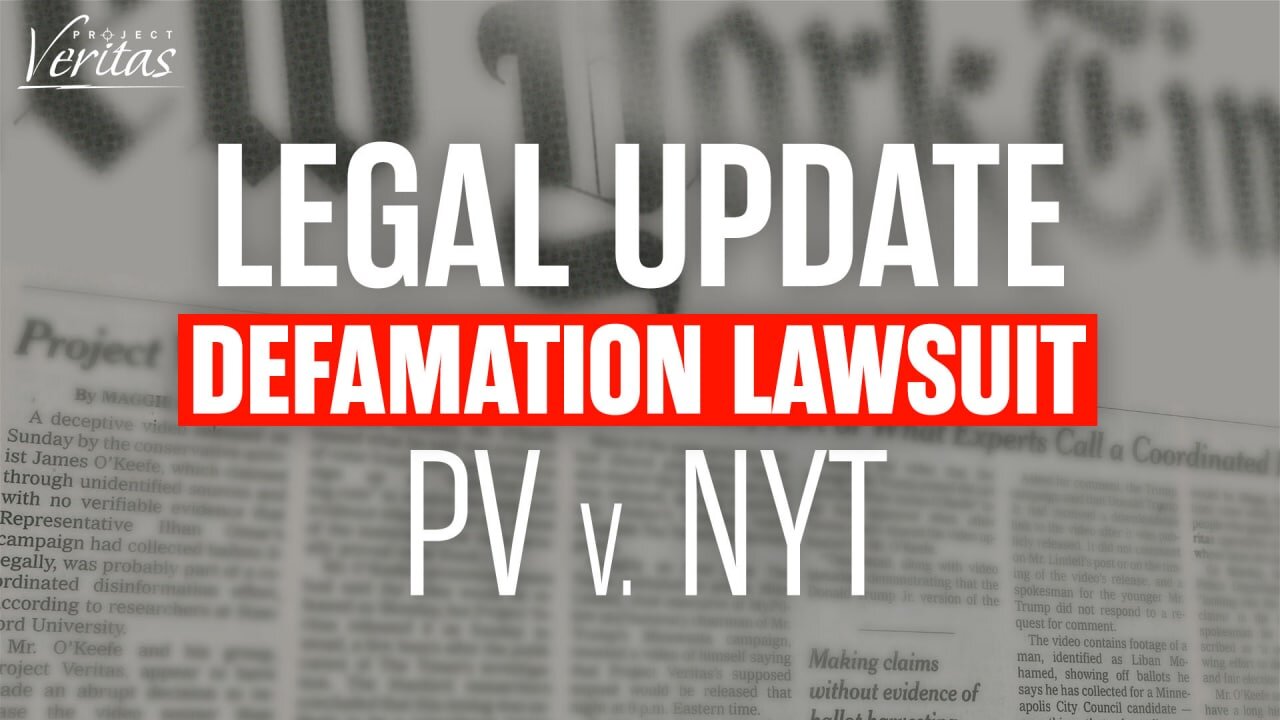Premium Only Content

NYT Attorneys Claim Words Don't Have "Meaning" In Attempt to Avoid Discovery in PV Defamation Case
NYT Attorneys Argue Words Don’t Have ‘Precise Meaning That is Readily Understood’ In Latest Attempt to Avoid Discovery in Defamation Case
• In an update regarding its defamation suit against the New York Times surrounding footage of illegal ballot harvesting in Minnesota, Project Veritas revealed that in their appellate brief, the New York Times’ attorneys argued that neither the words “deceptive” nor “verifiable” has a “precise meaning that is readily understood.”
• In their appeal, the NYT’s attorneys also responded to the New York Supreme Court’s suggestion that a reader might read the news section of the New York Times expecting news, the Times argued “the lower court offered no support for its conclusions or the novel obligation it created.” This argument contradicts the Times’ own policies which prohibit reporters from injecting their opinion into stories as Project Veritas’ attorney, Libby Locke, argued in a response.
• Also notable was an attempt by lawyers for the Times to decry the use of anonymous sources despite the Project Veritas video in question naming sources and the fact that the New York Times uses anonymous sources so often that it penned an editorial called “Why does the New York Times use anonymous sources?”
• The New York Times’ Motion to Dismiss Project Veritas’ defamation lawsuit was denied by the NY Supreme Court and the NYT has opted to appeal that decision. The suit stems from a decision by the paper to write five articles calling Project Veritas’ report on Minnesota ballot harvesting “deceptive” despite the video showing incontrovertible proof of illegal ballot harvesting. Despite seemingly admitting error in court filings, the New York Times still has not corrected the articles.
[NEW YORK – JULY 27, 2022] Project Veritas has revealed notable filings in their ongoing defamation suit with the New York Times which should raise some eyebrows including the argument that neither the words “deceptive” nor “verifiable” have a “precise meaning that is readily understood.”
In the aftermath of a September 2020 Project Veritas report which showed footage of illegal ballot harvesting in Minnesota, the New York Times wrote five articles saying the report was “deceptive” and not “verifiable.” Because you can see countless ballots on video and subjects of the investigation are heard expressing indifference to violating laws with respect to ballot harvesting, Project Veritas asked the New York Times to correct the articles, but the Times refused.. This resulted in a lawsuit which successfully survived a motion to dismiss causing the NYT to appeal.
There have been notable moments throughout the suit such as lawyers for the Times citing Wikipedia, the NYT publishing confidential legal memos prepared by Project Veritas’ attorneys of record in the suit , and New York Supreme Court Justice Charles Woods writing: “The Articles that are the subject of this action called the Video ‘deceptive,’ but the dictionary definitions of ‘disinformation’ and ‘deceptive’ provided by defendants’ counsel … certainly apply to [the New York Times’] failure to note that they interjected their opinion in news articles as they now claim.”
The Times continues to argue the news pieces were merely non-actionable opinion, claiming that “[n]either the word ‘deceptive’ nor the word ‘verifiable’ has a precise meaning that is readily understood.” The Times also pushed back on Justice Wood’s contention that reporting news in the news section (as opposed to opinion) is a “novel obligation” which the “lower court offered no support for.”
In a response, Project Veritas’ Attorney Libby Locke explains that the New York Times themselves created this so-called “novel obligation:”
The substance and context of the statements – in particular the fact that they appeared in Times news stories where The Times’ own policies prohibit reporters from injecting their opinion – could allow a reasonable reader to conclude that the statements were conveying facts about Veritas.
In a video reviewing the merits of the lawsuit, Project Veritas Founder and CEO James O’Keefe closed with a line from Supreme Court Justice Neil Gorsuch criticism of the notable media defamation case, New York Times v. Sullivan:
the published falsehoods are on a scale so great, “it has come to leave far more [Americans defamed] without redress than anyone could have predicted.”
Stay tuned as we wait for the Appellate Division to decide the future of this case.
-
 1:01:56
1:01:56
ThisIsDeLaCruz
16 hours ago $7.25 earnedInside Kenny Chesney’s Sphere Part 1: Exclusive Backstage Pass
34.4K1 -
 2:09:50
2:09:50
DLDAfterDark
6 hours ago $1.62 earnedA Complete Look Into The Glock "V Series"! Pistol In Hand! VERY GAY!!
19.6K -
 7:42
7:42
China Uncensored
13 hours agoIndia Has Surpassed China
42.9K16 -
 8:47
8:47
Hollywood Exposed
11 hours agoJoe Rogan and Zachary Levi DESTROY Gavin Newsom’s Lies About California
26.3K5 -
 2:09:50
2:09:50
BlackDiamondGunsandGear
5 hours agoInside NEW Glock V Models / Whats Next? / You giving up Glock?
30.9K2 -
 2:05:31
2:05:31
Glenn Greenwald
10 hours ago"Former" Al-Qaeda Leader Welcomed to the White House; The "New TikTok" Clamps Down on Israel Critics: With Influencer Guy Christensen; Dave Portnoy Decries Cancel Culture, Unless His Group is Under Attack | SYSTEM UPDATE #545
143K87 -
 7:30:07
7:30:07
Spartan
10 hours agoNine Sols
18.4K1 -
 2:34:56
2:34:56
SOLTEKGG
5 hours ago🔴 HUGE UPDATE - Veterans Day | Redbull x Dogtag Giveaway
16.9K1 -
 1:23:36
1:23:36
Flyover Conservatives
14 hours agoTough Love for Trump: What Must Change Now to Win Back America - Dennis Michael Lynch | FOC Show
26.8K5 -
 1:56:43
1:56:43
The White House
7 hours agoAbove, Below & Beyond: A Presidential Special
35K18